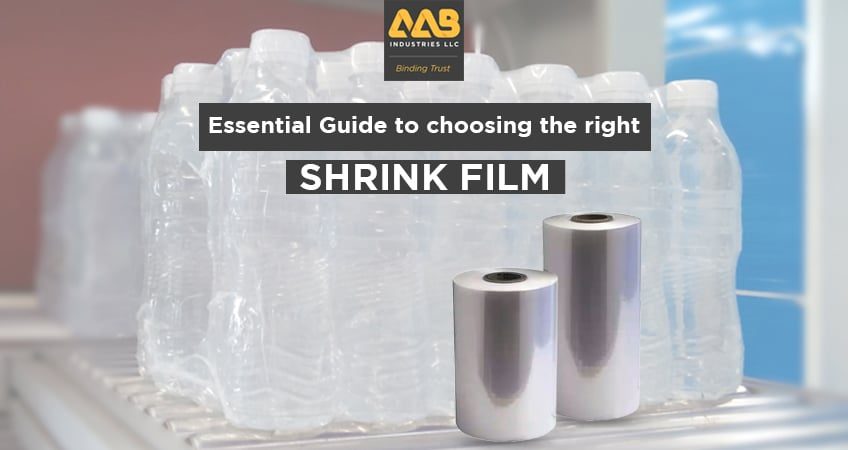Shrink film is an essential component of product packaging, used across retail shops and warehouses. It enhances product visibility, optimizes space by enabling stacking, and ensures product safety. With numerous types of shrink wrap available, selecting the right one for your packaging needs can be challenging.
In this blog, we will explore the types and applications of shrink wrap to help you choose the best option for your packaging line.
What is Heat Shrink Film?
Heat shrink film is a plastic material that tightly packs objects by shrinking around them when heat is applied. It secures products and protects them from dust, dirt, and moisture.
What is Shrink Wrap Made Of?
A common question is, “What is shrink wrap made of?” It typically consists of one of these three plastics:
- Polyvinyl Chloride (PVC)
- Polyethylene (PE)
- Low-Density Polyethylene (LDPE)
- Linear Low-Density Polyethylene (LLDPE)
- Polyolefin (POF)
The table below summarizes the characteristics of each shrink film type:
| Parameters | Polyvinyl chloride (PVC) | Polyethylene (PE) | Polyolefin (POF) |
| Shrink Temperature (°C) | 120-160 | 100-150 | 150-200 |
| Shrinkage Rate (%) | 50-60 | 30-50 | 20-30 |
| Thickness Range (microns) | 12-25 | 15-30 | 20-200 |
| Tensile Strength (MPa) | 25-30 | 40-50 | 15-20 |
| Transparency (Clarity %) | 90-95 | 80-85 | 60-70 |
| Elongation at Break (%) | 100-120 | 70-100 | 300-400 |
| Moisture Resistance | High | Moderate | Very high |
| Puncture Resistance | High | Low | Very high |
| Cost (Relative) | Medium | Low | Medium to high |
Key Features
- Heat shrink film conforms to the product’s shape when exposed to heat.
- It is printable and available in various colours.
- Shrink film comes in different sizes and can be used with heat tunnels or heat guns.
- Versatile in application, it is suitable for items ranging from small cosmetics to bulk electronics.
What is Shrink Wrap Used For?
- Protects consumer goods while maintaining visibility.
- Shields items from dust, moisture, and scratches during transport, storage, or retailing.
- Bundles bulk items, such as bottles, for easier handling.
- Helps manage storage space by stacking products efficiently.
- Acts as a tamper-evident seal for added security.
How to Choose the Right Shrink Film?
Each shrink film type serves specific industries based on its features. Here’s a quick guide:
| Type | Key Features | Best Applications |
| Polyolefin shrink film (POF) |
|
|
| PVC shrink film |
|
|
| Polyethylene shrink film (PE) |
|
|
Is Shrink Wrap the Same as Plastic Wrap?
Although both are made from plastic, shrink wrap and plastic wrap serve different purposes:
1. Material Composition
Shrink wrap is made from POF, PVC, or PE, while plastic wrap (cling wrap) is typically PVC or PE.
2. Applications
Shrink wrap secures items for packaging; plastic wrap is mainly used for food storage.
3. Heat Application
Shrink wrap requires heat to conform, whereas plastic wrap does not.
4. Functionality
Shrink wrap bundles and protects items, while plastic wrap seals containers and preserves food freshness.
FAQs
What is the Role of Shrink Wrap in Logistics?
Shrink wrap protects products from scratches, dirt, and moisture during transport. It also facilitates bulk handling and stacking, such as bundling beverage bottles.
Is Shrink Wrap Waterproof?
Yes, shrink film is waterproof, offering protection against spills and rain. However, long-term exposure to water may compromise its integrity.
What is the Difference Between Shrink Wrap and Shrink Film?
There is no difference. Both terms refer to the same product and can be used interchangeably.
What Can I Use Instead of Shrink Film?
No single product matches shrink wrap’s versatility. It protects, and enhances visibility, supports brand promotion, optimizes space, and simplifies handling.
What is the Formula for Shrink Film?
Shrink film is made of polymers that shrink upon heating. Common materials include PVC, PE, and POF.
What is the Chemical Composition of Shrink Film?
- PVC: (C2H3Cl)n
- PE: (C2H4)n
- POF: Typically a copolymer of polyethylene and polypropylene.


